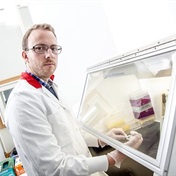For weeks, debate had been raging over government plans to bring 1990s legislation on stem cell research in line with scientific advances, setting the vast majority of Britain's highly-regarded science community against the power of the churches and pro-life groups.
A process in a dish"This is a process in a dish, and we are dealing with a clump of cells which would never go on to develop. It's a laboratory process," said Professor John Burn, whose Newcastle University team produced Britain's first chimeric embryo from human DNA and eggs from a cow last month.
For Burn, the legal go-ahead given by parliament to continue the research is a small, but significant step forward in the endeavour to understand the progress of major degenerative and killer diseases - from Parkinson's to cancer - and to develop drugs to fight them.
Opponents, however, say that there is no proof to back claims that so-called admix embryos would save lives on a massive scale, while insisting that mixing human and animal matter for research purposes was "immoral."
"It is difficult to imagine a single piece of legislation which more comprehensively attacks the sanctity and dignity of life than this particular bill," said Cardinal Keith O'Brien, the Roman Catholic Archbishop of St Andrew's and Edinburgh, one of its chief critics.
Public in favour
A consultation by the Human Fertilisation and Embryology Authority
(HFEA), which authorizes stem cell research, showed that 61 per cent of
the British public were in favour of hybrid embryo research if it
helped to improve understanding of serious diseases.
Prime Minister Gordon Brown had given the bill his explicit support, appealing to parliament to "help ourselves and future generations" and "not to turn our back on vital scientific advances."
While a number of high-profile members of the Brown cabinet had made clear that they would vote against the bill, its passage was secured by the support from the opposition Conservatives and Liberal parties.
14-day limit
The bill will, from next year, allow British scientists to insert
the nuclei of human cells into animal eggs, growing a hybrid embryo for
up to 14 days before it is destroyed.
In genetic terms, the embryos are 99.9 per cent human, as all their nuclear DNA comes from the human donor, scientists say.
At a practical level, researchers would, for example, take genetic material from a person with Parkinson's disease and put it into an empty animal egg to make stem cells that will carry the same genetic defects that cause Parkinson's.
"We think there is nothing illegal, immoral or unethical about this," said Professor Chris Shaw from Kings College London, who has applied to do hybrid work.
No animals will be created
"People think we are generating some sort of hybrid animal. This is
just cells. ... No animal is ever going to be created," said Shaw.
Scientists are keen to stress that the implantation of human-animal embryos in the womb is already illegal, and that the use of hybrids will make up for the shortage of human eggs available for research.
"This bill will make Britain the leader in stem cell research," said Professor Stephen Minger, head of stem cell research at King's College London. – (Sapa-dpa)
Read more:
Human-animal embryo breakthrough
Embryology laws pass first hurdle
May, 2008




 Publications
Publications
 Partners
Partners










